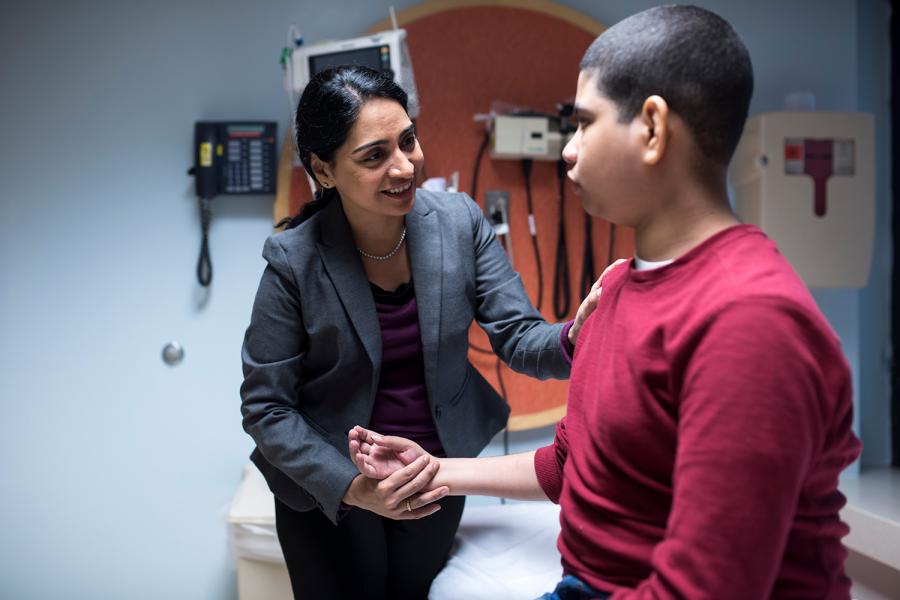
Stroke Rehabilitation Research
At NYU Langone’s Rusk Rehabilitation, our research has enabled us to develop innovative therapies, devices, and technology to improve patient outcomes for people who experience a stroke.
Beginning in 2018, Jonathan H. Whiteson, MD, launched efforts to establish a research community to study the role and value of aerobic exercise in recovery and rehabilitation not only in patients with cardiopulmonary conditions but also in patients who have had stroke.
Although Rusk Rehabilitation has been integral in developing groundbreaking treatments for post-stroke muscle stiffness, Dr. Whiteson examines the effects of exercise beyond strengthening weak muscles and improving endurance after a stroke. He is examining the effects of aerobic exercise at a neurochemical and cellular level and found that it enhances the traditional rehabilitation recovery rate and provides significant cognitive benefits.
In the Mobilis Laboratory, Heidi Schambra, MD, leads a research team working to understand motor recovery after stroke and developing mechanistically informed therapies to accelerate recovery. Funded by the National Institutes of Health, the laboratory takes a multimodal approach to stud the motor system, using neurophysiological (transcranial magnetic stimulation), neuromodulatory (transcranial direct current stimulation), neuroanatomical (diffusion kurtosis MRI), biomechanical (kinematics, electromyography), and behavioral methods. This experimental approach enables the complementary appraisal of systems supporting motor learning and recovery in the upper limbs.
In the Visuomotor Integration Laboratory, John-Ross (J.R.) Rizzo, MD, MSCI, and his team focus on the intersection between ocular motor control and appendicular motor control, with a particular emphasis on understanding the mechanisms of eye–hand coordination as they relate to stroke recovery. The long-term goal of the multidisciplinary research group is to streamline the development of comprehensive diagnostics and pragmatic therapies to rapidly detect impairment and more effectively promote function. Through behavioral methodology and advanced neuroimaging, our researchers study the biomechanics of eye and hand (oculography and motion capture) to answer questions that surround visuomotor integration in motor learning and recovery.
We translate our cumulative research efforts into improved patient treatments and therapies offered through our Commission on Accreditation of Rehabilitation Facilities (CARF)–accredited stroke rehabilitation program.
Recent Publications
Residual gaze behaviour during navigation in blindness and low vision
Disability & rehabilitation. Assistive technology. 2026 Jan 09; 1-26
Re-imagining sensory substitution through gestural control: Point-To-Tell 2
Disability & rehabilitation. Assistive technology. 2025 Nov 20; 1-19
Transcallosal inhibition does not influence subacute motor recovery in mild-to-moderate stroke
Brain. 2025 Nov 04; 148:3946-3957
Brain Age Is Longitudinally Associated With Sensorimotor Impairment and Mild Cognitive Impairment in Subacute Stroke
Journal of the American Heart Association. 2025 Oct 21; 14:e041603
Remote intentional music listening intervention to support mental health in individuals with chronic stroke: study protocol for a feasibility trial
BMJ open. 2025 Sep 18; 15:e109467
Common Data Elements for Rehabilitation Research in Neurological Disorders (NeuroRehab CDEs)
Archives of physical medicine & rehabilitation. 2025 Jul ; 106:981-988
Using Virtual Reality to Enhance Mobility, Safety, and Equity for Persons with Vision Loss in Urban Environments
Journal of urban health. 2025 Jun ; 102:655-669
Multidisciplinary collaborative guidance on the assessment and treatment of patients with Long COVID: A compendium statement
PM&R. 2025 Jun ; 17:684-708
